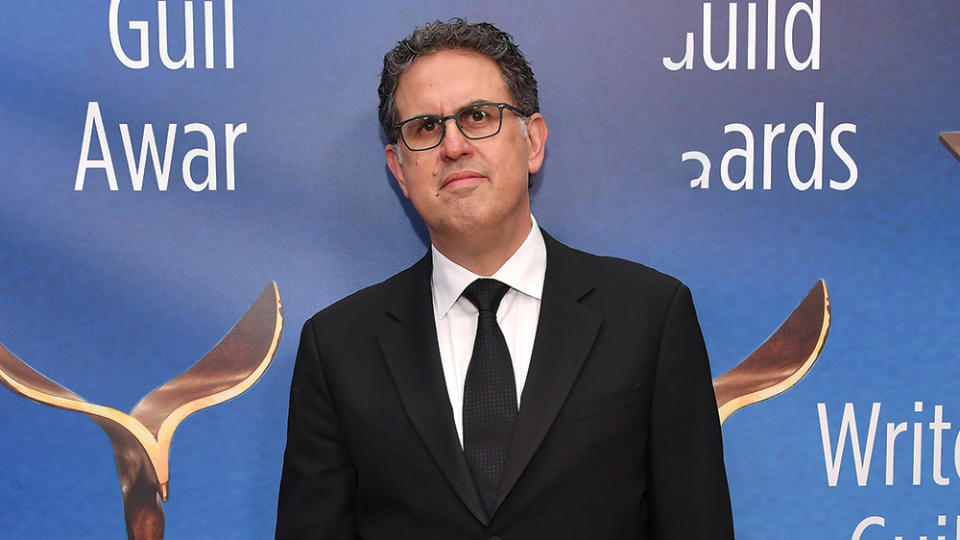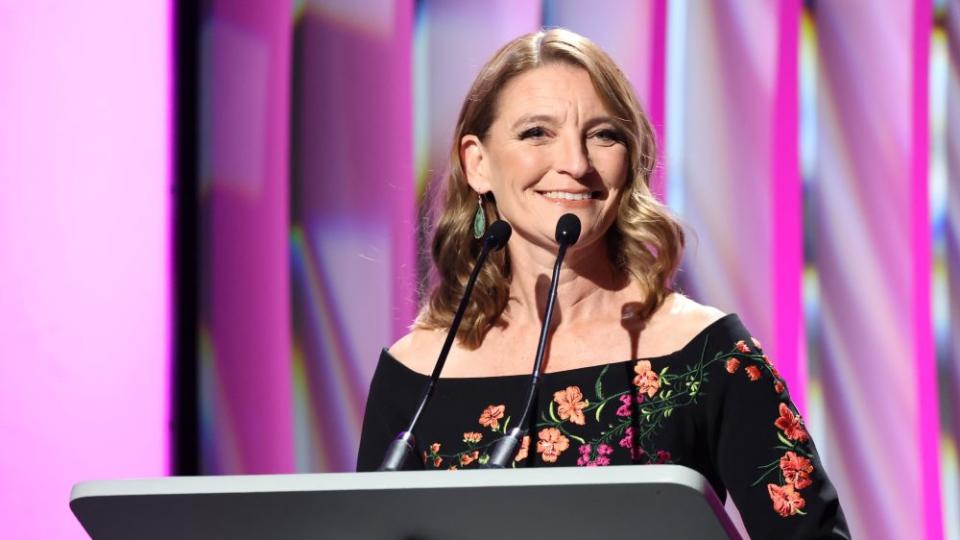WGA Takes Aim at Mini Rooms With Proposal to Set Minimum Staff Level for TV Series

The solo TV auteur may soon be a thing of the past.
The Writers Guild of America will sit down with the studios on Monday, and high on the agenda is setting a minimum staffing level for writers rooms. That means the days when Mike White or Craig Mazin could write an entire season of prestige TV all by themselves could be coming to an end.
More from Variety
WGA Argues That Writer Pay Is 'Falling Behind' in Shift to Streaming
WGA and AMPTP Exchange Proposals Ahead of Next Week's Negotiations
WGA Pushes Back on Gloomy Media Industry Outlook, Stressing Profits
The guild argues that studios are squeezing more work out of fewer writers over a shorter time span, and paying them less than they’re entitled to. And the union’s leadership believes that it’s time to set basic standards around the size and duration of a writers’ room.
Sorry, Mike White.
“We’ve talked to those members who are known for being the single writer on a show,” said David Goodman, co-chair of the WGA’s negotiations committee. “They’re fine with this proposal. They understand it. We make rules that we have to follow that have to be explained because they’re complicated, but they have value to the overall membership. We can absolutely do that and it’s something we should do.”

That is just one of many proposals the union has presented to the Alliance of Motion Picture and Television Producers as they prepare to bargain for a new three-year contract. The guild is also focused on raising minimum pay scales, improving residual formulas, and more esoteric subjects like raising the earnings cap on “span protection,” which would guarantee above-scale pay for high-income writers.
The guild’s proposals would cost roughly $600 million a year in total — or, union officials say, about 2% of the major studios’ operating profits. In a wide-ranging interview with Variety on Wednesday, guild leaders argued that the studios can afford it, and that current trends are making it harder and harder for writers to sustain a career.
“All these stories all lead to: we all have a problem with compensation,” said Meredith Stiehm, the president of WGA West. “It’s been going down and down.”
The guild leadership is particularly focused on requiring TV shows to hire a set number of writers for a minimum period of time. In traditional TV, a group of 15 or more writers would work for a full season, churning out scripts that would go into production week after week.
But in the streaming era, a showrunner might hire a handful of writers to quickly bang out the first few episodes, or even a full season — sometimes before the show is greenlit. Those writers are making guild minimums, rather than their typical fee, and they might not be around when the show goes into production.
“It’s not acceptable for the companies to just say, ‘Well now we want you do all the work with fewer people in a smaller amount of time and that’s fine,'” said Ellen Stutzman, the guild’s chief negotiator. “That’s a major problem for television writers. The guild has to look at saying, ‘This is how the business has operated, this is the amount of time it takes, and so writers have to be employed in that fashion.'”
Stiehm said that the guild’s proposals are about “codifying the way we were paid before.”
“They’ve got these new ideas, like mini rooms, that are trying to skirt that,” she said. “That’s why we’re having to set up all these new rules and norms.”
Goodman said that even the term “mini room” is dismissive, saying “It’s a writers room. A writers room is a writers room. Work is work.”

“The companies are getting something very very valuable… for much less than they should pay,” he said. “And writers who exist in that workspace aren’t making their year, can’t support themselves, can’t afford to live in L.A. And that’s just untenable.”
In the interview, the three leaders also addressed the fight over streaming viewership data, and expressed their hope that the negotiation can be resolved without a strike.
The following Q&A has been edited for length and clarity.
There’s more TV shows than ever before. More writers are working than during the strike 15 years ago. Total compensation is up. From those data points you wouldn’t say, “These folks are going to go on strike.” Can you explain why it is, given all that bounty and surplus that you see on your TV screen, that writers are feeling squeezed?
David Goodman: I don’t want to take for granted when you say, “Why are the writers going on strike?” That’s a decision that in no way has been made yet. All the talk about strike is really something that is brought out every three years whenever the guild negotiates. And it never comes from anybody at the guild. I think it reflects how the guild is viewed by the rest of the industry. People are afraid the guild might consider a strike because they know the guild is willing to fight for its members. I don’t want to just by omission accept the idea that a strike is inevitable. We are expecting to negotiate in good faith with the studios and hopefully find our way to a deal.
Ellen Stutzman: There has been an increase in shows. That’s gone along with the tremendous growth in the industry both in terms of revenue and profits. We’ve seen show budgets go up. But the companies are just paying writers less. They have put a ton of downward pressure on overscale pay. A decade ago only a third of TV series writers worked at minimum. Now it’s almost half. And a quarter of showrunners work at minimum, because the companies stretch them out over so many weeks to make shows that you would think don’t take as long, but they take as long as a full network order. Those people are making minimum. It’s just that the companies have squeezed a ton of value out of writers. So we’re in a situation where that’s not tenable anymore. It’s not tenable for writers to make a career out of this business.
You guys put out an annual report that has total earnings and residual compensation. Looking over a decade, those numbers are going up. The average is going up as well. In your report yesterday you said median weekly pay for writer-producers is down. Is median annual pay down as well?
Stutzman: Writers only report to the guild their minimum pay. The annual report doesn’t capture television overscale. When we do surveys, or we put out information about weekly pay, that is looking at total writer pay, overscale. I get more information from [talent] agencies now and can see the squeeze that’s happened in overscale. It’s gotten to the point that the guild has to address some of that in minimums. If they’re going to pay everyone, or a majority of people, in minimums, then those minimums have to go up to better reflect writer value.
Goodman: We had 7,000 writers answer questions on a survey. It told a story. Every writer across the board told us their income is the same or less than it used to be.

Can you define a mini room? Can you be specific about the abuses you’re trying to remedy?
Goodman: They’re doing the most important work in the life of a series. They’re gathering a group of writers in a room for a certain limited amount of time. And those writers create a series. They can create a whole season. All the writers in that room get paid minimum. So even if that show goes on to get picked up, those writers who participated in that – all they had was that minimum pay for that period. That’s probably the most egregious piece of the mini room problem. At the most important time in the life of the creation of a show, the writers are not being compensated for the work they’re creating. Generally the way it used to work, you had one writer write a pilot. Once it becomes a series, everybody involved is going to be paid overscale, get a chance to participate in its creation, and have pay that is more commensurate with their experience. In a mini room, again, writers with a lot of experience are getting paid the same as writers with no experience. And because it’s a smaller number of writers, it can exclude certain writers from that process. So there’s a million reasons why there needs to be guardrails put around that.
For overscale, isn’t that negotiated by your agent?
Goodman: That’s the difficulty that we’re running into. Yes, agents need to protect overscale income. And since the [WGA’s] agency campaign they now have a vested interest in trying to fix that. And they want to. They’re in communication with the guild on this issue. But the guild can also put some guardrails around this so that companies are more fairly compensating the writers involved.
Is one big-picture solution to just shift the whole template from being paid by the episode to paid by week?
Stutzman: It’s not sufficient to just do that. Because that doesn’t get at how many writers need to be around, how many writers need to work in order to make their year and be there for the production of the show.
We’ve been talking a lot about upfront compensation. We haven’t heard as much about residuals. How important is it, when we’re talking about the shift to streaming, to get a streaming residual that factors in success of a show or viewership data of some sort in this contract? Is that an essential – is that an existential issue going forward?
Goodman: I think the important issue is making sure that we’re getting a fair residual. There are a lot of issues about transparency. We actually get some of that information already. We didn’t maybe talk as much about it in the lead-up to this negotiation because it’s clear to us that we’ve got to improve the residual formula. The other things we’re taking on need more explanation. But it doesn’t mean it’s not important. It’s very important.
Stiehm: It’s under the umbrella of compensation, which is our big overall theme.
It doesn’t sound like it’s a make-or-break, that if there’s no formula that says a show that has 10 million viewers gets paid more than a show that has 10 viewers, then we’re going to walk.
Goodman: First of all, I’m not going to answer any question in that context. So don’t ask a question like that because I’m not going to answer it. The fact is, getting a good residual is really important to us. And obviously if we can get it tied to success that also is really important. People should be rewarded for the value they create.
Is there a creative way to do that that doesn’t involve streaming services giving up data they don’t want to give up?
Stutzman: No, and I think we have to overcome this myth that data cannot ever be given up. It’s just a great bargaining ploy on the part of the companies to act like that can never be given up. They all want to have advertisers help support their services, so the idea that no one is going to get access to this data, we have to move past. Writers and other talent in this industry have a long history of sharing in the success of programs via residuals. So I don’t think that construct should just go away.
You don’t want to talk about if there’s a strike. But if there is a strike, what is the slogan that’s on the picket sign? “We want more compensation”?
Goodman: Long before we got to a strike, the membership has to understand our agenda. And they do, and it’s about compensation. It’s all about compensation. They understand it because it’s their experience. Our agenda completely comes from their experience.
But you’re going to have to explain this to the general public that’s going to be without TV shows too.
Stiehm: Here’s how I think about it when explaining it to my dad. Budgets have gone up. Profits have gone up. Writers’ pay has gone down. This is a huge problem. It has to be fixed. That’s super clear. That’s the simple way I explain it to my 90-year-old dad.
Goodman: Also, the most important thing for us as a union is not the general public. It’s the membership. As long as the membership understands what they’re fighting for, that’s how we succeed. And then the general public sees how serious we are. And they pay attention and they understand what Meredith just explained.
Regarding span protection, I think there’s a view among some people that it may have inadvertently compelled productions to drop people sooner than they would have done. I’m sure you don’t buy into that, but what is the argument against that?
Goodman: The argument is the companies can afford to keep us on. We got span protection and that’s helped a number of writers with their compensation. The cap prevents it from helping all the writers. If we lifted the cap on span protection, the companies would have to find a way to pay us. They can. They can afford that proposal. The idea that there might be some inadvertent consequence has to be weighed against the fact that what we’re fighting for is fair compensation of writers for the work they’re providing.
For Ellen, you’re stepping into David Young’s shoes somewhat unexpectedly. And I’m wondering if you think there will be a difference? Do you bring a different style to the negotiation? Will it be exactly the same as if he were there?
Stutzman: We have the same approach to negotiations that this guild has. Which is, we negotiate using the power of our members. That is the only thing the companies respond to. I don’t think the companies or our membership should see it as something different. We have the same strategy.
Returning to the idea that there’s no such thing as an inevitable strike. It sounds like you all feel there is absolutely a path to making a deal.
Goodman: We can’t control how the companies react to our proposals. All we can do is make our proposals with a clear idea of what we’re trying to accomplish, and make sure that what we’re trying to accomplish is in the best interest of our members, and let the companies know that we’re serious. We’re not making these demands lightly. These are serious demands about the wellbeing of our members. We have to hope the companies are as serious about making a deal with us as we are.
Stutzman: There is broad recognition, even beyond our membership, that the changes in the business that are cutting writers out of the process or squeezing as much work out of them in the shortest amount of time for the lowest amount of pay have gone way too far. And that the idea that some kind of serious action is needed because the companies might not respond. So we always go in wanting to make a deal. It’s just that this union has been willing to fight for what it believes in.
Stiehm: We want a deal. That’s our goal. I’m just very struck by the support and unity of the membership. It’s complicated to figure out exactly what’s wrong and what the fix is. But what is not complicated is people coming to these member meetings and understanding we have a very big problem. It’s existential. We must act. And the vote was 98.4%. People are serious as David says. This is a serious negotiation and I think the companies know that. Hopefully we make a deal, that’s the best outcome.
Goodman: But we’re also not afraid to fight.
Cynthia Littleton contributed to this report.
Best of Variety
Final Oscars Predictions: Animated Short - Will the Academy Go for 'The Boy' or 'Dicks?'
Final Oscar Predictions: Documentary Short - Will the Academy Go for Malala or 'Elephants?'
Sign up for Variety’s Newsletter. For the latest news, follow us on Facebook, Twitter, and Instagram.

